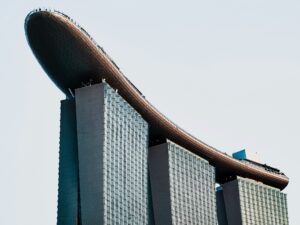Shifting Investment Trends: A Look into Asia Pacific Real Estate in 2024

In the coming year, the Asia Pacific real estate market is poised for transformation as investors increasingly prioritize diversification across asset classes. Christopher Pilgrim, the managing director of Colliers Asia Pacific Global Capital Markets, anticipates a continued evolution in investor behavior, characterized by greater adaptability and a fluid approach to geographic and asset class considerations.
Geographic diversification is expected to emerge as a key strategy for investors in the region, according to Pilgrim. Notably, institutional capital is flowing into “alternative” sectors such as multifamily, senior living, and student housing. Pilgrim views this shift as a strategic repositioning towards more lucrative investment avenues.
Beyond alternative assets, real estate magnates are exploring thematic investments on a global scale. Pilgrim notes that investors are increasingly drawn to narratives aligning with overarching themes, fostering a strategic approach that extends beyond traditional market boundaries.
The focus on environmentally, socially, and governance (ESG)-compliant assets is set to continue into 2024, as more investors recognize the value these assets bring. Catherine Chen, Director for Asia Pacific Research at Cushman & Wakefield, suggests that ESG-friendly assets could drive rental growth in sectors like industrial real estate.
Simultaneously, the flight-to-quality trend in the office and logistics sector is compelling stakeholders to commit further to addressing sustainability and climate change. Christine Li, Head of Research at Knight Frank Asia Pacific, emphasizes the growing importance of these considerations in shaping investment decisions within the real estate landscape.
Anticipating a Market Upturn: Positive Trends Forecasted for 2024
The upcoming year is poised to bring about a significant transformation in the property market, fueled by expectations of higher transaction volumes attributed to the stabilization of interest rates.
Investors and developers have grappled with the challenges posed by interest rate hikes, particularly in regions like Hong Kong, Australia, and South Korea, which have felt the adverse effects, as highlighted by Chen.
Christopher Pilgrim, Managing Director of Colliers Asia Pacific Global Capital Markets, reflects on the volatility of 2023, noting it as one of the most tumultuous periods in recent history due to global interest rate rises and inflation. These challenges have affected both debt and equity investors across various real estate asset classes.
Pilgrim expresses optimism about the anticipated stabilization of interest rates, emphasizing its potential to rejuvenate confidence within the debt markets. This, in turn, is expected to catalyze an upswing in lending and borrowing activities.
Christine Li, Head of Research at Knight Frank Asia Pacific, echoes Pilgrim’s positive outlook, foreseeing 2024 as an “upturn for real estate investment markets” in the Asia-Pacific (APAC) region. Li points to the potential for a soft landing in the global economy, with the Federal Reserve pausing its extended rate hike cycle. This, she believes, will lead to a narrowing of bid-ask spreads and a rebound in investment activity.
Li emphasizes the ongoing role of the Asia-Pacific as the primary engine of growth for the global economy. As China’s recovery solidifies, these favorable conditions are expected to continue supporting the region’s real estate sectors. Overall, the consensus among experts suggests a promising upturn in the market for the upcoming year.
Dominance of Offices: APAC Real Estate Investment Landscape
In the realm of investments, offices have emerged as the predominant asset class in the Asia-Pacific (APAC) region, claiming the highest transaction volumes. Cushman and Wakefield’s data reveals that the office sector constituted 38% of transactions in the first half of 2023.
Christine Li, Head of Research at Knight Frank Asia Pacific, notes that office demand in APAC outperformed that in the United States and Europe, driven by a robust return-to-office trend in the region. Despite ongoing rationalization of employee headcount by tech occupiers, financial and professional services firms, along with flexible space operators, have filled the void in leasing activity.
Knight Frank’s data indicates a continued decline in office rents across the APAC region in 2023, with a 1.8% decrease as of the first half of the year. Martin Wong, Director and Head of Research & Consultancy for Greater China at Knight Frank, attributes the market’s sluggish performance to ample supply and the cautious approach of investors in the high-interest environment.
Li concurs with this assessment, pointing out that the rise in funding costs and concerns about slowing economic growth have prompted developers to exercise caution.
Buyers, in turn, are becoming more selective in their choices. Li adds, “Office property landlords are responding to the structural challenges posed by hybrid working styles and a flight-to-quality trend.
Tenants are increasingly focusing on the quality of the space they occupy rather than sheer quantity.” The evolving dynamics in the office market underscore the adaptability required by landlords and tenants alike in navigating the shifting landscape.
Industrial Sector Gains Momentum: Shifts in Investment Trends Across APAC
Following the dominance of the office sector, the industrial segment emerges as a noteworthy player in the investment landscape of the Asia-Pacific (APAC) region.
Christopher Pilgrim highlights a sustained increase in capital allocation towards logistics assets in APAC, reflecting a growing focus on the industrial sector. Catherine Chen, Director for Asia Pacific Research at Cushman and Wakefield, supports this observation, noting that the share of industrial investment has risen from a 10-year average of 17% (2013 to 2022) to 22% in the first half of 2023 (1H23).
Chen attributes this shift to the APAC region’s status as a major logistics hub, experiencing a demand surge from a rising middle class. She emphasizes that the market remains underserved by modern and high-quality logistics facilities, driving increased investment in this sector.
E-commerce and third-party logistics (3PL) players, along with manufacturers, play crucial roles in propelling the industrial market forward, according to Christine Li, Head of Research at Knight Frank Asia Pacific.
While e-commerce demand normalizes, the focus on optimizing the logistics footprint continues to drive the need for modern facilities. Li notes a preference for institutional-grade facilities in core areas and last-mile locations, fueling robust leasing activity in the region.
Furthermore, Li identifies the China+1 strategy as a significant driving force behind the expansion of major manufacturers in Southeast Asia. This strategy, which involves diversifying manufacturing and logistics assets beyond China, has heightened interest in the industrial sector across Southeast Asia, aligning with the region’s evolving investment landscape.
As the industrial sector gains momentum, investors are strategically navigating the opportunities presented by the dynamic APAC market.
Retail Sector Resilience: A Closer Look at Singapore’s Investment Landscape
In the realm of investment, the retail sector in Singapore has proven to be a standout performer, outshining even the robust industrial segment.
Catherine Chen highlights the retail sector’s notable achievement, revealing that retail investment constituted over half of the total transaction volume in Singapore during the first half of 2023 (1H23).
She attributes this success to substantial deals orchestrated by key players like Frasers and Link REIT, underlining the sector’s significance in Singapore’s investment landscape.
Expanding the perspective to the broader Asia-Pacific (APAC) region, Christopher Pilgrim emphasizes the retail sector’s remarkable resilience and strength when compared to other regions.
Pilgrim notes that the APAC retail sector has consistently demonstrated robust performance, maintaining stabilized yields for an impressive streak of 12 months.
This resilience signifies the enduring relevance of the retail sector in the APAC investment landscape, painting a positive picture for investors and stakeholders.
The sector’s ability to weather challenges and sustain consistent performance further underscores its integral role in the dynamic and ever-evolving world of real estate investments.
Residential Real Estate Sees a Resurgence: Investor Interest Peaks in Hong Kong and Australia
In tandem with the retail sector, the residential real estate market is experiencing a notable resurgence, with heightened investor interest, particularly in Hong Kong and Australia.
Christopher Pilgrim sheds light on the growing investment trend in the apartment subsector in both Hong Kong and Australia. Notably, in the first half of 2023 (1H23), apartments accounted for 16% and 14% of total investments in the respective markets.
Residential sales in Hong Kong are showing robust performance, driven by developers adopting more aggressive strategies to clear their inventory, as highlighted by Martin Wong, Director and Head of Research & Consultancy for Greater China at Knight Frank. Additionally, many developers are actively working to address the needs of investors from the past two to three years, signaling a proactive approach to align with current market dynamics.
On the buyer side, Christine Li underscores the strategic timing of the market pause in rate hikes, as buyers leverage this window of opportunity to secure their dream homes.
The temporary respite in rate hikes has provided a favorable environment for prospective homeowners to make their moves, contributing to the overall vibrancy of the residential real estate sector.
As investor and buyer activities align, the residential sector in Hong Kong and Australia stands as a promising domain, reflecting positive sentiments and renewed vigor in the evolving landscape of real estate investments.



